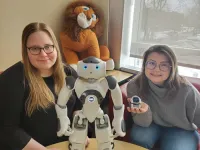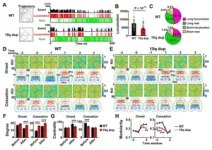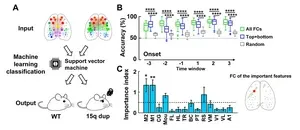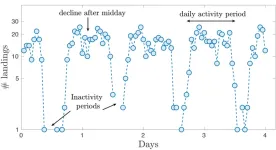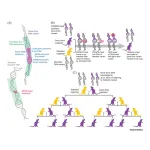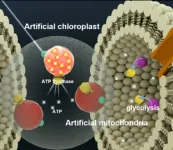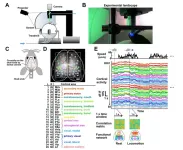(Press-News.org) Who do children prefer to learn from? Previous research has shown that even infants can identify the best informant. But would preschoolers prefer learning from a competent robot over an incompetent human?
According to a new paper by Concordia researchers published in the Journal of Cognition and Development, the answer largely depends on age.
The study compared two groups of preschoolers: one of three-year-olds, the other of five-year-olds. The children participated in Zoom meetings featuring a video of a young woman and a small robot with humanoid characteristics (head, face, torso, arms and legs) called Nao sitting side by side. Between them were familiar objects that the robot would label correctly while the human would label them incorrectly, e.g., referring to a car as a book, a ball as a shoe and a cup as a dog.
Next, the two groups of children were presented with unfamiliar items: the top of a turkey baster, a roll of twine and a silicone muffin container. Both the robot and the human used different nonsense terms like “mido,” “toma,” “fep” and “dax” to label the objects. The children were then asked what the object was called, endorsing either the label offered by the robot or by the human.
While the three-year-olds showed no preference for one word over another, the five-year-olds were much more likely to state the term provided by the robot than the human.
“We can see that by age five, children are choosing to learn from a competent teacher over someone who is more familiar to them — even if the competent teacher is a robot,” says the paper’s lead author, PhD candidate Anna-Elisabeth Baumann. Horizon Postdoctoral Fellow Elizabeth Goldman and undergraduate research assistant Alexandra Meltzer also contributed to the study. Professor and Concordia University Chair of Developmental Cybernetics Diane Poulin-Dubois in the Department of Psychology supervised the study.
The researchers repeated the experiments with new groups of three- and five-year-olds, replacing the humanoid Nao with a small truck-shaped robot called Cozmo. The results resembled those observed with the human-like robot, suggesting that the robot’s morphology does not affect the children’s selective trust strategies.
Baumann adds that, along with the labelling task, the researchers administered a naive biology task. The children were asked if biological organs or mechanical gears formed the internal parts of unfamiliar animals and robots. The three-year-olds appeared confused, assigning both biological and mechanical internal parts to the robots. However, the five-year-olds were much more likely to indicate that only mechanical parts belonged inside the robots.
“This data tells us that the children will choose to learn from a robot even though they know it is not like them. They know that the robot is mechanical,” says Baumann.
Being right is better than being human
While there has been a substantial amount of literature on the benefits of using robots as teaching aides for children, the researchers note that most studies focus on a single robot informant or two robots pitted against each other. This study, they write, is the first to use both a human speaker and a robot to see if children deem social affiliation and similarity more important than competency when choosing which source to trust and learn from.
Poulin-Dubois points out that this study builds on a previous paper she co-wrote with Goldman and Baumann. That paper shows that by age five, children treat robots similarly to how adults do, i.e., as depictions of social agents.
“Older preschoolers know that robots have mechanical insides, but they still anthropomorphize them. Like adults, these children attribute certain human-like qualities to robots, such as the ability to talk, think and feel,” she says.
“It is important to emphasize that we see robots as tools to study how children can learn from both human and non-human agents,” concludes Goldman. “As technology use increases, and as children interact with technological devices more, it is important for us to understand how technology can be a tool to help facilitate their learning.”
END
Preschoolers prefer to learn from a competent robot than an incompetent human, Concordia study shows
Researchers at the Cognition and Language Development Lab tested three- and five-year-olds to see whether robots could be better teachers than people
2023-03-28
ELSE PRESS RELEASES FROM THIS DATE:
Prepare for landing: making airports more efficient
2023-03-28
WASHINGTON, March 28, 2023 – Air traffic is a significant and complex problem. Near misses between passenger planes on runways have been making headlines lately and raising safety concerns as airports try to accommodate more travelers in the wake of COVID-19. Also, as any disgruntled air traveler knows, a single aircraft’s late arrival at a busy airport can trigger an avalanche effect and cause a series of subsequent delays.
In Chaos, from AIP Publishing, a team of scientists from Spain and Argentina presented an original oscillating short-term memory model, with just two parameters, to study the dynamics of landing events at 10 ...
What should we call evolution driven by genetic engineering? Genetic welding, says researcher
2023-03-28
With CRISPR-Cas9 technology, humans can now rapidly change the evolutionary course of animals or plants by inserting genes that can easily spread through entire populations. Evolutionary geneticist Asher Cutter proposes that we call this evolutionary meddling “genetic welding.” In an opinion paper publishing March 28 in the journal Trends in Genetics, he argues that we must scientifically and ethically scrutinize the potential consequences of genetic welding before we put it into practice.
“The capability to do genetic welding has only taken off in the last few years, and much of the thinking about it has focused on what can happen ...
The powerhouse of the future: Artificial cells
2023-03-28
WASHINGTON, March 28, 2023 – Energy production in nature is the responsibility of chloroplasts and mitochondria and is crucial for fabricating sustainable, synthetic cells in the lab. Mitochondria are not only “the powerhouses of the cell,” as the middle school biology adage goes, but also one of the most complex intracellular components to replicate artificially.
In Biophysics Reviews, by AIP Publishing, researchers from Sogang University in South Korea and the Harbin Institute of Technology in China identified the most promising advancements and greatest challenges of artificial mitochondria ...
Pediatric mental health hospitalizations at acute care hospitals in the US
2023-03-28
About The Study: In this analysis of a national data set representing an estimated 4.7 million pediatric hospitalizations between 2009 and 2019, the number and proportion of pediatric acute care hospitalizations due to mental health diagnoses increased significantly. The majority of mental health hospitalizations in 2019 included a diagnosis of attempted suicide, suicidal ideation, or self-injury, underscoring the increasing importance of this concern.
Authors: Mary Arakelyan, M.P.H., of the Dartmouth Hitchcock Medical ...
Using virtual reality to investigate autism’s neural network dynamics
2023-03-28
An international research collaboration has developed a VR*1 imaging system that can measure a wide range of neural activity in the cortices of mice during active behavior. This enabled them to illuminate the abnormalities in cortical functional network*2 dynamics that are found in autism*3 model mice. Using machine learning*4, they were also able to highly accurately distinguish between autism model mice and wild-type mice based on the cortical functional network patterns when the mice start or stop running. The research group was led by Professor ...
Fibroblast inhibitors assist anti-cancer drugs to suppress cancer growth
2023-03-28
WASHINGTON, March 28, 2023 – Fibroblasts build and maintain the extracellular matrix, or physical scaffolding for cells, in the connective tissues within the body. It is believed that cancerous tumors can recruit nearby fibroblasts and use them to promote their own growth and invasion. This process, called cancer-associated fibroblast activation, can also protect tumors from chemotherapy and make treatment difficult.
In APL Bioengineering, by AIP Publishing, researchers from Academia Sinica, National Yang Ming Chiao Tung University, National Taiwan University Hospital, and National Taiwan University developed ...
Risk of adverse surgical outcomes among patients with recent COVID-19 infection
2023-03-28
About The Study: The findings of this study that included 29,000 patients suggest that recent COVID-19 infection was not associated with risk of adverse postoperative outcomes, regardless of timing within the previous 60 days.
Authors: William J. O’Brien, M.S., of Veterans Affairs Boston, is the corresponding author.
To access the embargoed study: Visit our For The Media website at this link https://media.jamanetwork.com/
(doi:10.1001/jamanetworkopen.2023.4876)
Editor’s Note: Please see the article for additional information, including other authors, ...
Association of daily step patterns with mortality in adults
2023-03-28
About The Study: In this study of 3,101 adult participants, the number of days per week taking 8,000 steps or more was associated with a lower risk of all-cause and cardiovascular mortality in a curvilinear fashion. The findings suggest that for adults who face difficulties in exercising regularly, achieving the recommended daily steps only a couple days a week may have meaningful health benefits.
Authors: Kosuke Inoue, M.D., Ph.D., of Kyoto University in Kyoto, Japan, is the corresponding ...
PCORI approves $123 million for research on postpartum care, hypertension management, antibiotic prescribing and a range of conditions
2023-03-28
WASHINGTON, DC – The Patient-Centered Outcomes Research Institute (PCORI) today announced funding awards totaling $123 million to support 15 new research studies. These studies aim to fill evidence gaps, enhance research methods, or improve health care decision making for a range of high-burden concerns among adults and children, including postpartum complications occurring in populations experiencing the greatest disparities in health outcomes.
In addition, PCORI awarded $4 million for two implementation projects intended to accelerate uptake of strategies shown in PCORI-funded studies, one to improve decision making about colorectal ...
Molecular mechanisms of disease pathophysiology: Journal of Pharmaceutical Analysis articles provide novel insights
2023-03-28
The burden of cardiovascular, metabolic, and neurological diseases (including ischemic heart disease, stroke, diabetes, and Parkinson’s disease) is particularly high, and these conditions affect millions around the world annually. In order to develop effective treatment strategies against these diseases, it is important to delineate the cellular and molecular pathways that contribute to their development. Three pre-clinical studies published in Volume 13 Issue 2 of Journal of Pharmaceutical Analysis have done just that.
The first study, published online on December 5, 2022, focused on myocardial infarction (MI), better known as a heart attack. Given that the ...
LAST 30 PRESS RELEASES:
Breaking the efficiency barrier: Researchers propose multi-stage solar system to harness the full spectrum
A new name, a new beginning: Building a green energy future together
From algorithms to atoms: How artificial intelligence is accelerating the discovery of next-generation energy materials
Loneliness linked to fear of embarrassment: teen research
New MOH–NUS Fellowship launched to strengthen everyday ethics in Singapore’s healthcare sector
Sungkyunkwan University researchers develop next-generation transparent electrode without rare metal indium
What's going on inside quantum computers?: New method simplifies process tomography
This ancient plant-eater had a twisted jaw and sideways-facing teeth
Jackdaw chicks listen to adults to learn about predators
Toxic algal bloom has taken a heavy toll on mental health
Beyond silicon: SKKU team presents Indium Selenide roadmap for ultra-low-power AI and quantum computing
Sugar comforts newborn babies during painful procedures
Pollen exposure linked to poorer exam results taken at the end of secondary school
7 hours 18 mins may be optimal sleep length for avoiding type 2 diabetes precursor
Around 6 deaths a year linked to clubbing in the UK
Children’s development set back years by Covid lockdowns, study reveals
Four decades of data give unique insight into the Sun’s inner life
Urban trees can absorb more CO₂ than cars emit during summer
Fund for Science and Technology awards $15 million to Scripps Oceanography
New NIH grant advances Lupus protein research
New farm-scale biochar system could cut agricultural emissions by 75 percent while removing carbon from the atmosphere
From herbal waste to high performance clean water material: Turning traditional medicine residues into powerful biochar
New sulfur-iron biochar shows powerful ability to lock up arsenic and cadmium in contaminated soils
AI-driven chart review accurately identifies potential rare disease trial participants in new study
Paleontologist Stephen Chester and colleagues reveal new clues about early primate evolution
UF research finds a gentler way to treat aggressive gum disease
Strong alcohol policy could reduce cancer in Canada
Air pollution from wildfires linked to higher rate of stroke
Tiny flows, big insights: microfluidics system boosts super-resolution microscopy
Pennington Biomedical researcher publishes editorial in leading American Heart Association journal
[Press-News.org] Preschoolers prefer to learn from a competent robot than an incompetent human, Concordia study showsResearchers at the Cognition and Language Development Lab tested three- and five-year-olds to see whether robots could be better teachers than people
